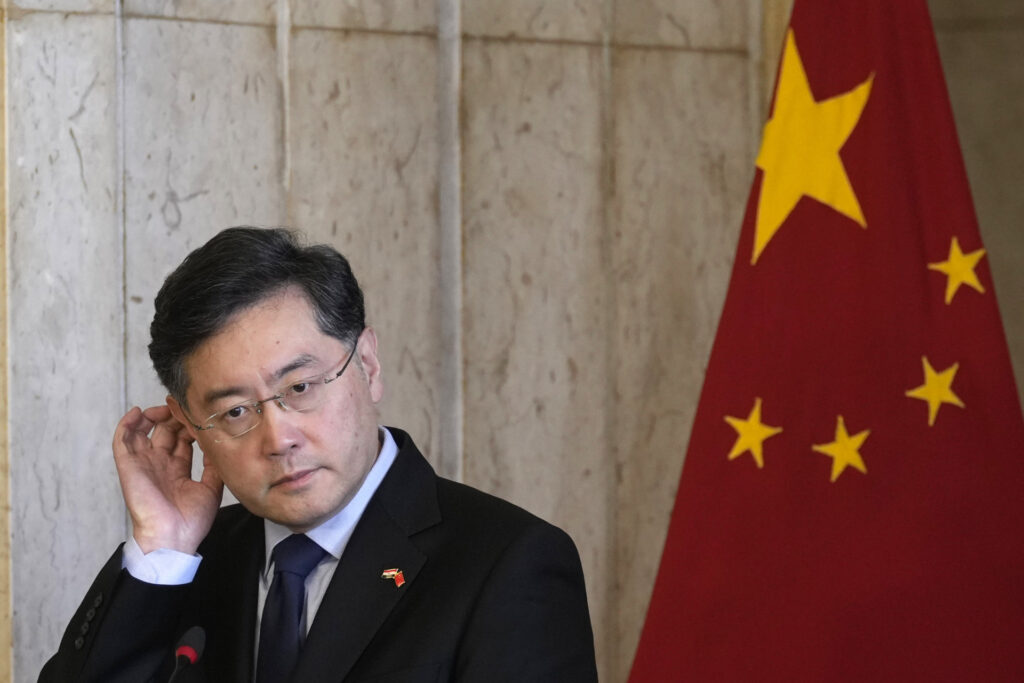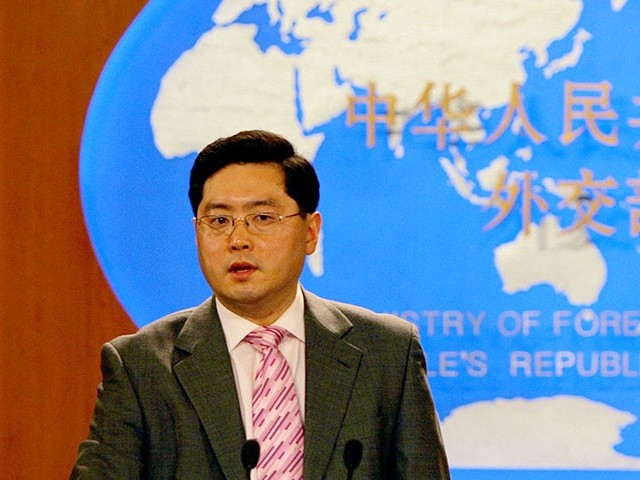China’s government media outlets confirmed the ouster of Qin Gang as the nation’s foreign minister on Tuesday, offering no details as to why the top diplomat, who began his term in January, suddenly lost his job.
Qin has been missing since June 25, when he made his last appearance at an event featuring his counterparts from Vietnam, Russia, and Sri Lanka. His name and biography no longer appear on the “principal officials” page of the Chinese Foreign Ministry’s website and the page dedicated to the Foreign Minister simply reads, “updating…” at press time on Tuesday.
The decision to remove Qin occurred at a special session of the National People’s Congress (NPC) Standing Committee, the body of lawmakers that convenes year-round. The state-run Xinhua News Agency announced the news as the “appointment” of a new foreign minister, rather than the removal of the current minister, downplaying the odd nature of the decision given that Qin spent less than a year in his office.
His replacement – Wang Yi, Qin’s predecessor and current head of the Communist Party’s Office of the Foreign Affairs Commission – also suggests that the decision was made as a result of the need to remove Qin rapidly rather than as a product of finding a new, more suitable man for the job. Wang is currently in Africa for a meeting of BRICS country diplomats and a tour of allies in the region, engagements that Qin inexplicably did not attend.

File/Chinese Foreign Minister Qin Gang, listens during a press conference with his Egyptian counterpart Sameh Shoukry, at the foreign ministry headquarters in Cairo, Egypt, on Jan. 15, 2023. He disappeared soon after. (AP Photo/Amr Nabil, File)
The Foreign Ministry has refused to offer any clarity in the past month regarding its leader’s sudden disappearance and the abrupt cancellation of several critical engagements, most prominently his absence at the Association of Southeast Asian Nations (ASEAN) summit in mid-July. While a Ministry spokesman, Wang Wenbin, ultimately blamed “health reasons” for Qin not attending the event, he did so shortly after denying that he had any information regarding any adverse health situations involving Qin.
The Foreign Ministry holds daily press briefings on weekdays. Spokeswoman Mao Ning, who tended to Tuesday’s briefing, did not take questions about Qin, according to the official transcript of the event. Mao took a question about Qin’s absence last week, but only responded “I have no information to provide.” That question also did not appear in the official transcript, only in videos of the briefing in question.
Given the lack of official information from Beijing, sensational rumors regarding Qin began surfacing following his event cancelations. The most prominent, shared openly on the heavily censored Chinese social media outlet Weibo, linked Qin to a prominent journalist, PhoenixTV host Fu Xiaotian. Fu’s posts on Weibo – including a bizarre “happy birthday” post to no one coincidentally published on Qin’s birthday and the sudden appearance of an infant son – fueled speculation of an extramarital affair between Qin and Fu. Qin’s biography on the Chinese Foreign Ministry website identifies him as “married with a son;” Fu is not publicly known to be married or have a partner.
Other rumors claimed that Qin, who had developed a reputation as a firebrand while serving as Chinese ambassador to the United States, clashed with Wang, who enjoys significantly more influence and power in the Party’s inner circle. No information has substantiated those rumors, however.
Xinhua reported that Qin was one of two officials to be replaced during the special NPC session; the other is Yi Gang, the now-former governor of the People’s Bank of China. The NPC replaced Yi with Pan Gongsheng, a rising economic figure in the Communist Party. Yi served as the head of the bank since 2018 and hit the official minister retirement age of 65 this year, so his removal was expected. He actually spent some more months in the role than outside observers expected, potentially to give the Party time to find an adequate replacement.
In contrast, Qin Gang is 57 years old, far from retirement age, and made no public indications that he was interested in stepping down from his role as foreign minister. Like Xinhua, the state-run Chinese propaganda newspaper Global Times offered no details on Qin’s removal, instead offering general biographical information on Wang Yi and on Qin, ending the article with a remark against America that Qin made during a recent press event. The Times did acknowledge that Qin had disappeared, indicating that he had merely left the public eye, rather than vanished completely.

File/China’s then ambassador to the United States Qin Gang speaks at a media briefing. | (Elizabeth Dalziel/AP Photo)
“The last time Qin made a public appearance was on June 25 for meetings with the Russian, Vietnamese, and Sri Lankan foreign ministers, according to media reports,” the Global Times noted.
The Global Times, like other English-language Chinese government outlets, essentially stopped recognizing Qin’s existence in mid-July. The newspaper mentioned “China’s foreign minister” in an article on China’s relationships with African countries on Sunday, but strangely did not identify Qin by name.
The state media outlet also increased coverage of the Communist Party’s “discipline inspection” – its mechanism for purging officials who genocidal dictator Xi Jinping no longer trusts – in the past week.
“It is urgent to stipulate clearly the relevant operation system, work responsibilities and mechanism of the discipline inspection commissions of the Central Party and State Institutions through institutional means,” the Global Times fretted in an article last week, lamenting that Party officials were increasingly corrupt and the federal oversight framework was “relatively weak.” The article did not mention Qin, but did not a case of lower-level officials who had reportedly engaged in “sexting” through the state-controlled communications app WeChat.
On Tuesday, during the meeting that resulted in Qin’s removal, the NPC reportedly also discussed “better implementing the Party Central Committee’s principles and policies regarding the fight against corruption and the protection of private enterprises in accordance with the law,” Xinhua reported. The NPC reportedly presented an amendment to deal more harshly with officials who take bribes.
No rumors at press time have accused Qin of taking bribes. The most prominent suggestion in Chinese social media is that he engaged in an inappropriate relationship with Fu, the PhoenixTV journalist. Fu interviewed Qin for her television program in March 2022 and referred to that interview as her last in her final post on Weibo and Twitter, published in April. The message posted in April debuted an infant son, Er-Kin, and featured both the baby and an image of Qin.
Last time flying alone with this aircraft was from LA to DC for a work visit, and that both happily and sadly turned to be the very last interview I did with Talk with World Leaders. This time to fly out with this aircraft was also from LA, but with precious baby son Er-Kin pic.twitter.com/C8izukrkzj
— Fu Xiaotian 傅曉田 (@xiaotianphoenix) April 10, 2023
The now-former foreign minister’s disappearance became a growing embarrassment for China in the past two weeks, as Beijing failed to keep engagements with international partners and sent a message that the officials claiming to represent China one day may abruptly vanish the next. The Foreign Ministry’s spokespeople apparently being kept uninformed about the situation – prompting ridicule on Weibo – added to the confusion.
“Secrecy is the chosen mode of operation because for the Chinese Communist Party, information is a weapon, but in this case, the mystery surrounding such an important official — foreign minister — is mind-boggling,” Jamestown Foundation senior fellow Willy Wo-Lap Lam, noted last week.
Ian Chong of the National University of Singapore suggested that Weibo, which typically erases information the Communist Party does not want in the public sphere almost immediately, allowing mockery of the Foreign Ministry and Fu Xiaotian rumors to persist “[made] people wonder if there is any truth to rumors about power struggles, corruption, the abuse of power and positions, and romantic relationships.”


